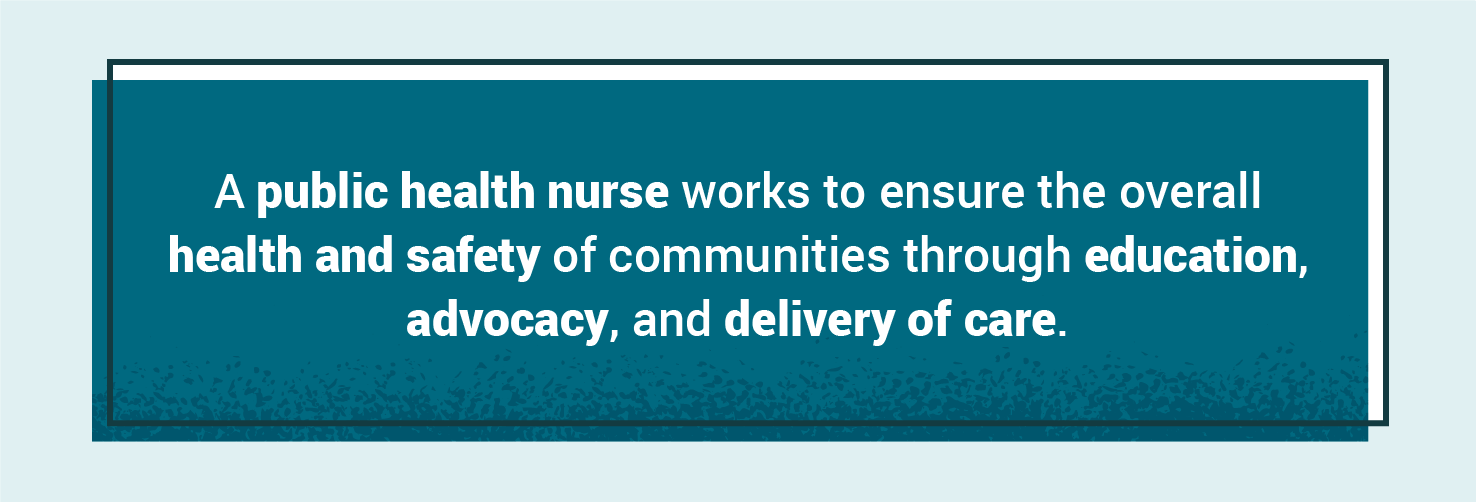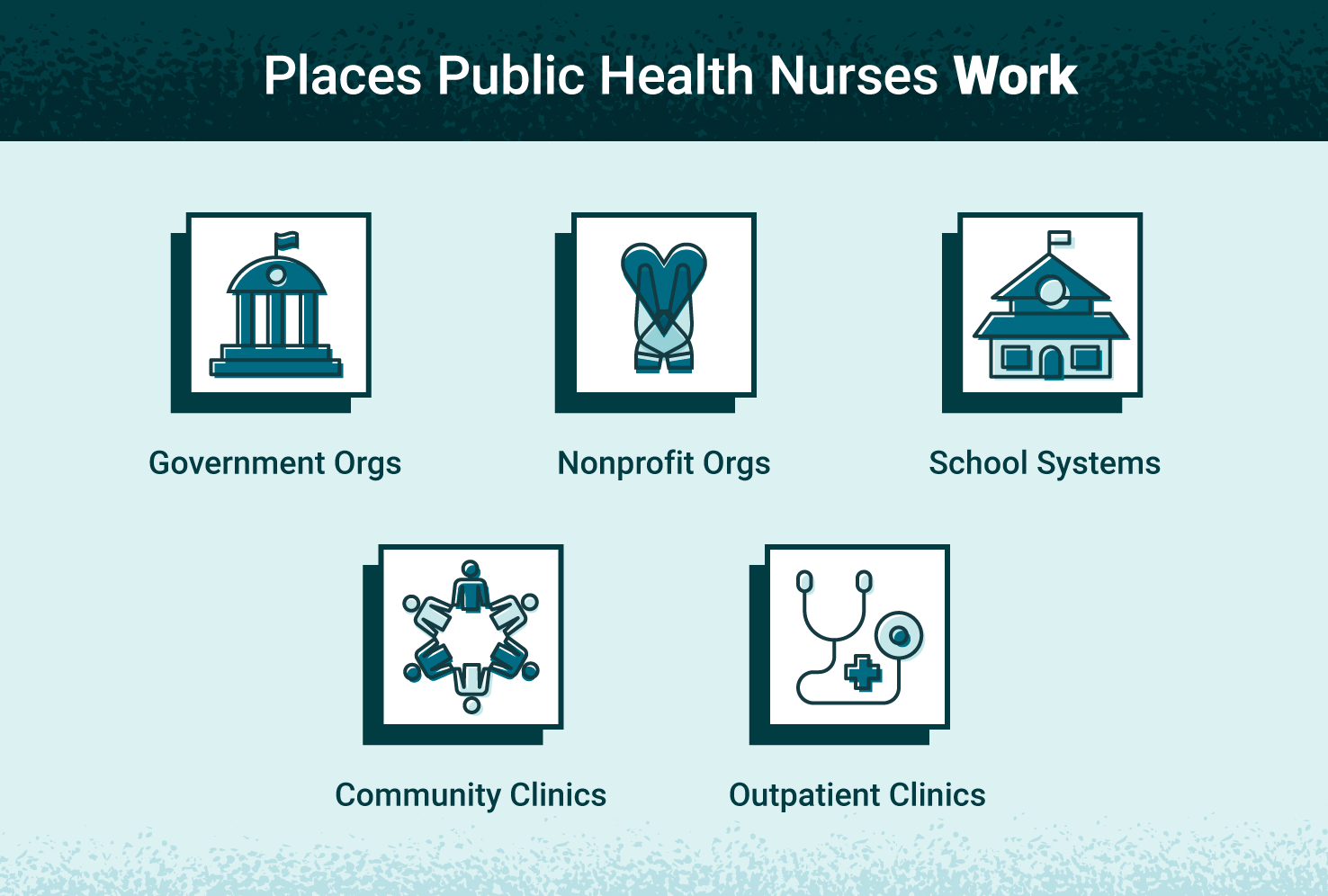
Public health nurses play a critical role in improving population health outcomes by educating communities and delivering care within them. In this leadership position, registered nurses are able to make positive changes through policy reform and community-building. 1
Throughout the COVID-19 pandemic, U.S. public health nurses have served on the frontlines, not only treating patients but also educating them about the disease, tracing their contacts, and delivering self-isolation guidance. 2 This post discusses the role of a public health nurse and the steps you need to take to enter this profession.
What Is a Public Health Nurse? 3


A public health nurse is a registered nurse (RN) who advocates for positive changes in population health. This exciting career gives nurses the opportunity to work directly within communities to educate people and give them the tools they need to improve their health outcomes.
What Does a Public Health Nurse Do?
The role of a public health nurse is to promote public wellness. In this capacity, nurses focus on helping underserved and at-risk individuals gain access to the care they need. The main goal of public health nurses is to help prevent disease and reduce health risks at the population level through evidenced-based care and education.
In general, the responsibilities of public health nurses include:
- Recording and analyzing aggregate medical data
- Evaluating the health of patients and creating treatment plans
- Monitoring patients for any changes in condition
- Delivering top-quality care alongside physicians
- Educating patients about available support services and helping them access care
- Emphasizing primary prevention in order to avoid disease or injury before it occurs
- Working with public health officials to help underserved communities gain access to care
- Developing a relationship with patients and following up to track progress
- Referring patients to other providers as needed
- Assessing health trends in communities
- Managing budgets of public health programs
A principal goal of public health nursing is to address the health disparities within marginalized communities by focusing on the environmental, physical, and social determinants of health. These are the conditions that influence individual and group differences in health status. They include economic stability, educational level, healthcare access, food security, the neighborhood and built environment, and social issues such as racial discrimination. Working for social justice is a key aspect of the role of the public health nurse, who promotes change through policy reform, community building, and system-level interventions.
Qualities of a Public Health Nurse
The best public health nurses are excellent communicators and critical thinkers, and they are able to juggle multiple priorities. Nurses in this field tend to be enthusiastic and have a genuine interest in protecting community health. Public health nursing is a great role for anyone who enjoys problem-solving, working with a network of professionals, impacting lives, and influencing change.
How to Become a Public Health Nurse


While it’s possible to become licensed after completing a hospital-based diploma nursing program or an associate degree in nursing, the ideal educational path is to earn your Bachelor of Science in Nursing (BSN) degree, because it tends to open the most doors. But whichever path you take, you will need to obtain your RN licensure by passing the NCLEX-RN examination.
After some time as a practicing nurse, if you want to enhance your knowledge and credentials, consider earning your graduate nursing degree. Both the Master of Science in Nursing (MSN) and Doctor of Nursing Practice (DNP) include more coursework in leadership and advocacy, which are key aspects of a public health nursing practice. Depending on the university, the MSN or DNP may offer the option to become a nurse practitioner, a career choice with more responsibilities and more autonomy. The nurse educator role specialty may also be offered, which prepares nurses for teaching in a variety of settings.
Where Do Public Health Nurses Work? 5


As a public health nurse or community health nurse, you will likely be predominantly focused on improving community health care services and providing direct clinical services to at-risk populations. You could have the chance to work in a variety of different settings, including:
- Government organizations, such as county or state health departments, to develop policy and find new ways to improve population health
- Nonprofit organizations, such as the Red Cross, to support healthy communities and educate staff on ways to boost community health
- School systems, to educate students on personal hygiene, sexual health, and the importance of maintaining a healthy lifestyle
- Community clinics, to provide information on prominent community health problems and develop educational programs aimed to help community members improve their own health
- Outpatient clinics, as health education leaders who address individual patient concerns and encourage them to make healthy lifestyle choices
Job Outlook and Salary Range
The U.S. Bureau of Labor Statistics (BLS) does not offer specific data on the specialty of public health nursing or community health nursing; however, it currently lists the median salary of a registered nurse as $73,300. The BLS projects the employment of registered nurses to grow 12 percent (much faster than average) from 2018 to 2028. It estimates that during that same period, 371,500 RN jobs will open. The profession of registered nurse was ranked #9 in U.S. News & World Report’s 2020 Best Healthcare Jobs list.
Working as a public health nurse can be a meaningful, rewarding experience. As they have demonstrated during the COVID-19 pandemic, public health nurses play a crucial role in disease prevention and mitigating community health crises. Public health nurses are reliable responders who deliver safe, effective, and nondiscriminatory primary care to the communities they serve. If you’re passionate about the fight to improve population health, becoming a community nurse may be a great fit for you.
The University of St. Augustine for Health Sciences (USAHS) offers a Master of Science in Nursing (MSN), Doctor of Nursing Practice (DNP), and Post-Graduate Nursing Certificates designed for working nurses. Our degrees are offered online, with optional on-campus immersions* and an annual interprofessional trip abroad. Role specialties include Family Nurse Practitioner (FNP)*, Nurse Educator,** and Nurse Executive. The MSN has several options to accelerate your time to degree completion. Complete coursework when and where you want—and earn your advanced nursing degree while keeping your work and life in balance.
*The FNP role specialty includes two required hands-on clinical intensives as part of the curriculum.
**The Nurse Educator role specialty is not available for the DNP program.
Sources:
- American Public Health Association, “The Definition and Practice of Public Health Nursing,” 2013: https://www.apha.org/-/media/files/pdf/membergroups/phn/nursingdefinition.ashx?la=en&hash=331DBEC4B79E0C0B8C644BF2BEA571249F8717A0
- Edmonds et al., “A Call to Action for Public Health Nurses During the COVID-19 Pandemic,” Public Health Nursing, April 12, 2020: https://onlinelibrary.wiley.com/doi/full/10.1111/phn.12733
- Explore Health Careers, “Public Health Nurse”: https://explorehealthcareers.org/career/nursing/public-health-nurse/
- Nurse Source, “Public Health Nurse”: https://www.nursesource.org/publichealth.html
- Nurse Journal, “5 Places Where Public Health Nurses Work”: https://nursejournal.org/public-health-nursing/5-places-where-public-health-nurses-work/








